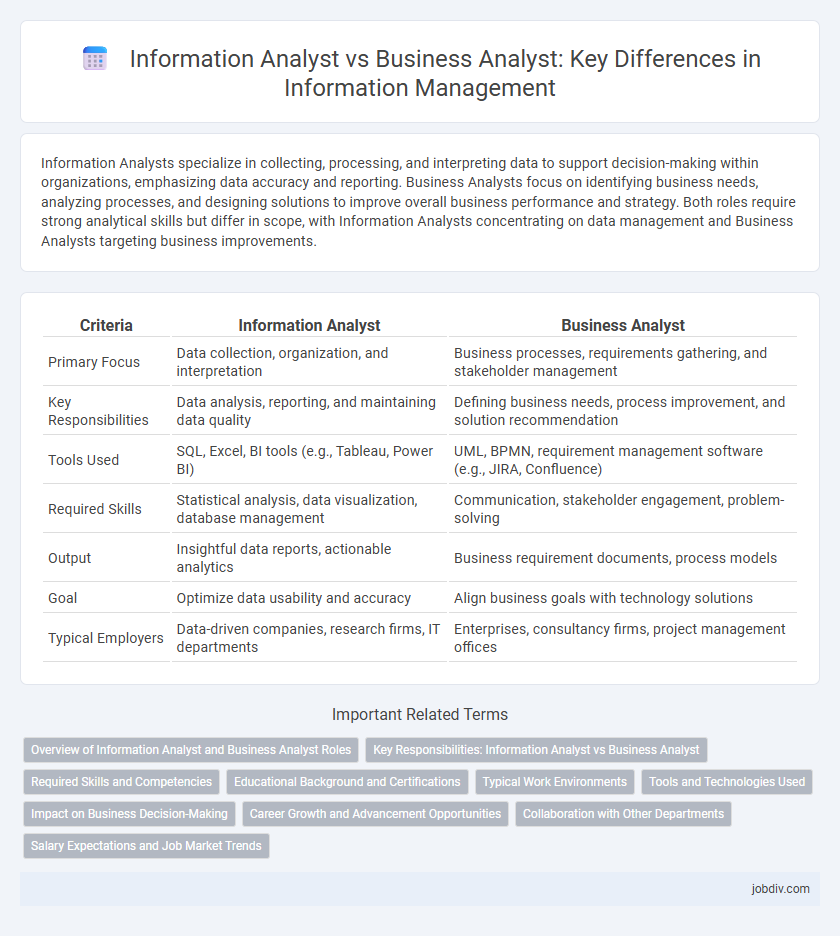Information Analysts specialize in collecting, processing, and interpreting data to support decision-making within organizations, emphasizing data accuracy and reporting. Business Analysts focus on identifying business needs, analyzing processes, and designing solutions to improve overall business performance and strategy. Both roles require strong analytical skills but differ in scope, with Information Analysts concentrating on data management and Business Analysts targeting business improvements.
Table of Comparison
| Criteria | Information Analyst | Business Analyst |
|---|---|---|
| Primary Focus | Data collection, organization, and interpretation | Business processes, requirements gathering, and stakeholder management |
| Key Responsibilities | Data analysis, reporting, and maintaining data quality | Defining business needs, process improvement, and solution recommendation |
| Tools Used | SQL, Excel, BI tools (e.g., Tableau, Power BI) | UML, BPMN, requirement management software (e.g., JIRA, Confluence) |
| Required Skills | Statistical analysis, data visualization, database management | Communication, stakeholder engagement, problem-solving |
| Output | Insightful data reports, actionable analytics | Business requirement documents, process models |
| Goal | Optimize data usability and accuracy | Align business goals with technology solutions |
| Typical Employers | Data-driven companies, research firms, IT departments | Enterprises, consultancy firms, project management offices |
Overview of Information Analyst and Business Analyst Roles
Information Analysts specialize in collecting, processing, and interpreting data to support decision-making and optimize information systems, emphasizing data accuracy and trend analysis. Business Analysts focus on identifying business needs, defining requirements, and facilitating communication between stakeholders to enhance organizational processes and project outcomes. Both roles require strong analytical skills, but Information Analysts prioritize data management while Business Analysts concentrate on business strategy and process improvement.
Key Responsibilities: Information Analyst vs Business Analyst
Information Analysts focus on collecting, processing, and analyzing data to generate actionable insights that improve organizational efficiency. Business Analysts primarily identify business needs, gather requirements, and facilitate communication between stakeholders to drive project success and strategic initiatives. Both roles require strong analytical skills, but Information Analysts emphasize data accuracy and interpretation, while Business Analysts concentrate on aligning solutions with business goals.
Required Skills and Competencies
Information Analysts require strong data interpretation skills, proficiency in statistical tools, and expertise in data management and visualization software like SQL, Python, and Tableau. Business Analysts excel in stakeholder communication, process modeling, and requirements gathering with competencies in tools such as Jira, BPMN, and advanced Excel for business forecasting. Both roles demand analytical thinking and problem-solving skills, but Information Analysts focus more on technical data analysis, while Business Analysts emphasize business process improvement and strategic planning.
Educational Background and Certifications
Information Analysts typically hold degrees in computer science, information technology, or data science, often supplemented by certifications such as Certified Information Systems Analyst (CISA) or Microsoft Certified: Data Analyst Associate. Business Analysts usually possess educational backgrounds in business administration, finance, or economics, with professional certifications like Certified Business Analysis Professional (CBAP) or PMI Professional in Business Analysis (PMI-PBA) enhancing their expertise. Both roles benefit from strong analytical skills, but their education and certifications emphasize different aspects of data management and business strategy.
Typical Work Environments
Information Analysts typically work in data-focused environments such as technology firms, financial institutions, and healthcare organizations where data accuracy and analysis are crucial. Business Analysts operate mainly within corporate settings, including consulting firms, retail companies, and government agencies, emphasizing process improvement and stakeholder communication. Both roles demand collaboration across departments but differ in their primary focus on data integrity versus business process optimization.
Tools and Technologies Used
Information Analysts utilize data visualization tools like Tableau, SQL databases, and programming languages such as Python or R to extract and analyze large datasets, enabling data-driven decision-making. Business Analysts employ process modeling software like Microsoft Visio, requirements management tools such as JIRA, and ERP systems including SAP to bridge business needs with IT solutions. Both roles depend on advanced analytics platforms and collaboration tools, but Information Analysts emphasize technical data manipulation, while Business Analysts focus on strategic business process optimization.
Impact on Business Decision-Making
Information Analysts enhance business decision-making by providing accurate data interpretation and trend analysis, enabling data-driven strategies. Business Analysts focus on aligning business processes with strategic goals, identifying improvement opportunities and facilitating communication between stakeholders. Together, their collaboration ensures informed decisions that optimize operational efficiency and drive business growth.
Career Growth and Advancement Opportunities
Information Analysts typically advance by specializing in data management, quality assurance, and analytics technologies, leading to roles such as Data Scientist or Information Systems Manager. Business Analysts often experience career growth by enhancing strategic planning, stakeholder communication, and project management skills, progressing to positions like Product Manager or Business Development Director. Both roles offer strong advancement opportunities, but Information Analysts generally transition deeper into technical expertise, while Business Analysts move toward leadership and cross-functional business strategy roles.
Collaboration with Other Departments
Information Analysts and Business Analysts both collaborate extensively with departments such as IT, marketing, and finance to ensure data-driven decision making aligns with business goals. Information Analysts focus on data interpretation and reporting accuracy, working closely with technical teams to optimize data systems. Business Analysts prioritize stakeholder communication and process improvement, facilitating cross-departmental workflows to enhance operational efficiency.
Salary Expectations and Job Market Trends
Information Analysts typically command salaries ranging from $60,000 to $90,000 annually, reflecting their expertise in data management and analysis, while Business Analysts often earn between $65,000 and $95,000 due to their focus on business process improvements and stakeholder communication. The job market for Information Analysts shows steady growth driven by increasing data reliance, whereas Business Analysts benefit from a broader demand across industries adapting to digital transformation. Employment projections indicate a 10% growth rate for Information Analysts and a 14% growth rate for Business Analysts over the next decade, with salary increments influenced by geographic location, industry, and experience level.
Information Analyst vs Business Analyst Infographic

 jobdiv.com
jobdiv.com